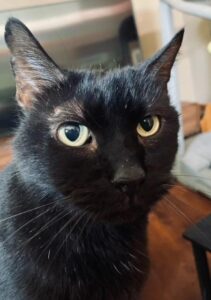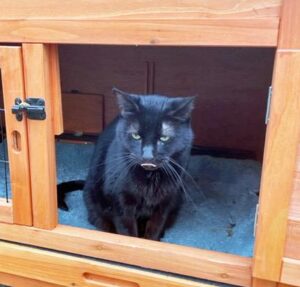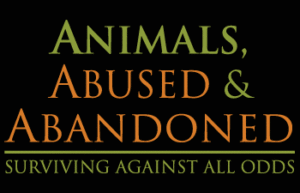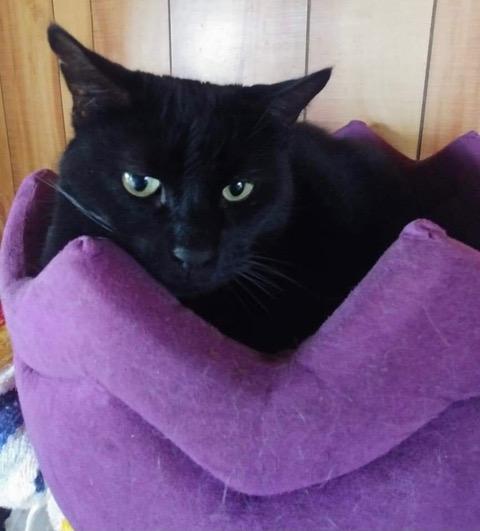Rosie was rescued from a high-kill shelter with her six kittens. Her babies were adopted, but Rosie, being a short-haired, black feline without distinguishing markings, was continually rejected because of the broad public prejudice against black cats, and the general preference for different colored and multi-colored cats. Time was becoming an urgent matter for Rosie because she was scheduled to be euthanized to make room for new intakes.  At the last minute, a cat sanctuary dedicated to long-term cat welfare took her to their facility to live out the rest of her life.
At the last minute, a cat sanctuary dedicated to long-term cat welfare took her to their facility to live out the rest of her life.
Ten years have passed, and Rosie is about 12 years old now. Recently she began to sneeze, had a stuffy, runny nose, developed conjunctivitis, and had a fever and decreased appetite. Rosie was taken to the vet for an urgent medical evaluation. It was quickly noted that the back of her mouth was raw, and her throat was inflamed. The vet described it as “raw hamburger”. Her blood work indicated an infection. Swabs from her mouth were sent to the lab to screen for the suspected presence of the calicivirus. While waiting for the results, she was given buprenorphine to help with her unrelenting, gnawing pain. The lab results came back a few days later, confirming Rosie tested positive for the virus. She was given doxycycline for ten days, to prevent secondary infections, prior to her scheduled surgery to remove all her teeth.
She returned to the sanctuary the afternoon of her dental surgery, and that evening, she ate a little soft food and drank some water.  The next morning, she demanded attention and was let out of her room where she had been kept alone to recover without the inquisitiveness of other cats.
The next morning, she demanded attention and was let out of her room where she had been kept alone to recover without the inquisitiveness of other cats.
Rosie had classic stomatitis, an inflamed mouth with painful ulcers on the tongue, gums and palate making it excruciatingly painful to eat or drink. Full mouth dental extraction provides the best chance to control the disease but does not cure it. Vaccinated cats for the calicivirus develop some immunity, but due to the various strains of the virus, (not all are covered by the vaccine), they will experience milder symptoms if exposed to other cats with the virus.
Veterinarian dental surgery is very expensive, and far beyond the sanctury’s ability to pay for it. Should you wish to help with her surgery expenses, please consider a tax-deductible donation to Animals Abused & Abandoned here.

